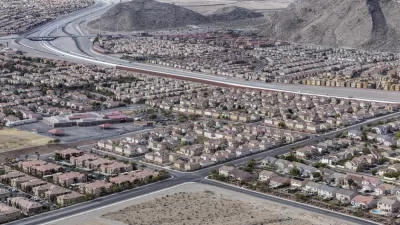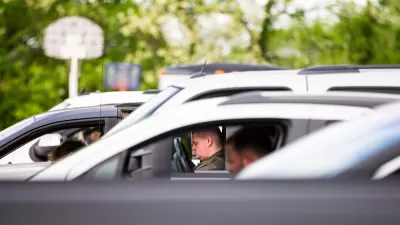The car-centric design of many U.S. cities traps young people at home, preventing them from engaging in social activities and urban life.

In an opinion piece published in Congress for New Urbanism’s Public Square, high school senior Rahul Rejeev argues that “The lack of effective transit, coupled with the lack of kid-friendly destinations and the feeling of more dangerous neighborhoods, means that today’s youth find it harder than ever to go outside, meet up with friends, and form more meaningful relationships.”
The American reliance on the personal automobile particularly impacts young people, many of whom face barriers that prevent them from getting their licenses or buying cars even when they’re old enough. “Lack of mobility coupled with large distances means that kids are far from the places where they want to hang out,” isolating them from social and economic opportunities. “Public transport is the only guaranteed way for a young person to be free and enjoy mobility,” Rejeev writes.
For Rejeev, zoning reform, pedestrian-friendly infrastructure, and efficient public transit are not just ways to curb carbon emissions and reduce car dependency, but also significant ways to improve the lives of young people.
FULL STORY: Children, left behind by suburbia, need better community design

Maui's Vacation Rental Debate Turns Ugly
Verbal attacks, misinformation campaigns and fistfights plague a high-stakes debate to convert thousands of vacation rentals into long-term housing.

Planetizen Federal Action Tracker
A weekly monitor of how Trump’s orders and actions are impacting planners and planning in America.

In Urban Planning, AI Prompting Could be the New Design Thinking
Creativity has long been key to great urban design. What if we see AI as our new creative partner?

How Trump's HUD Budget Proposal Would Harm Homelessness Response
Experts say the change to the HUD budget would make it more difficult to identify people who are homeless and connect them with services, and to prevent homelessness.

The Vast Potential of the Right-of-Way
One writer argues that the space between two building faces is the most important element of the built environment.

Florida Seniors Face Rising Homelessness Risk
High housing costs are pushing more seniors, many of them on a fixed income, into homelessness.
Urban Design for Planners 1: Software Tools
This six-course series explores essential urban design concepts using open source software and equips planners with the tools they need to participate fully in the urban design process.
Planning for Universal Design
Learn the tools for implementing Universal Design in planning regulations.
Gallatin County Department of Planning & Community Development
Heyer Gruel & Associates PA
JM Goldson LLC
City of Camden Redevelopment Agency
City of Astoria
Transportation Research & Education Center (TREC) at Portland State University
Jefferson Parish Government
Camden Redevelopment Agency
City of Claremont





























